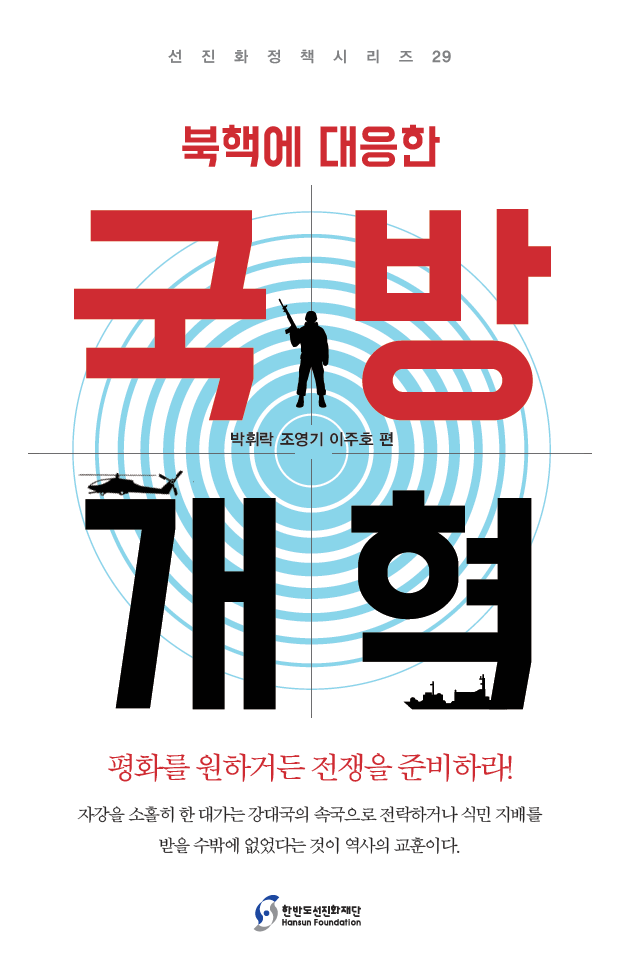National Defense Reform to Counteract the North Korean Nuclear
- Author : Hwi-Rak Park et al.
- Publisher : 2017.03.22
- Price : 22,000
- ISBN-10 :
- ISBN-13 : 978-89-93093-22-3

The essence of national defense and security are self-defense, alliance and balance of power. Evidently double self-defense strategy is the most fundamental strategy.
The primary responsibility of national defense is to preserve the nation-state sovereignty. It implies that alliance is necessary to complement the deficiency of self-defense. A country fails to protect itself if it solely relies on alliance. However, for the last 70 years, South Korea tend to maintain ‘self-defense based on alliance’ rather than ‘alliance based on self-defense.’ Now the country must pursue the opposite way to preserve its own sovereignty.
Chapter 1.
Blueprint of National Defense Reform
Written by Sung-Han Kim , Kyu-duk Hong ・ 15
○ Introduction
○ Progress of National Defense Reform
○ Challenge and Goal of National Defense Reform
○ Blueprint of National Defense Reform
○ Conclusion
Chapter 2.
Direction of National Defense Reform in the Nuclear Threats Era
Written by Hwi-Rak Park ・ 63
○ Introduction
○ The North Korea’s Nuclear Threats Evaluation and Demand for National Defense
○ Evaluation on the Republic of Korea Armed Force’s Readiness Posture
against the North Korea’s Nuclear Threats
○ National Defense Reform to Counteract the North Korean Nuclear Issues
○ Conclusion
Chapter 3.
Advancement Strategies for the Republic of Korea Armed Forces’ Defense Acquisition System
Written by Jong-Ha Kim ・115
○ Introduction
○ Ideal Model of the Defense Acquisition System
○ Operation Realities of Advanced Countries’ Defense Acquisition System
○ Analysis on Drawbacks of the Republic of Korea’s Defense Acquisition System’s Operation Process
○ Policies to Improve Effectiveness and Responsibility of the Defense Acquisition System
○ Conclusion
Chapter 4.
Innovation Method for the National Defense
Research and Development System
Written by Ju-Ho Lee, Tae-Jung Ha ・157
○ Introduction
○ Current Issues of the National Defense Research and Development
○ Innovation and Opening-up Method for the National Defense Research and Development
○ Conclusion
Chapter 5.
Strategic Human Resource Management to Secure Outstanding Sergeant Major
Written by Hyun-Joon Kim, Hyun-Hee Park, Dong-Chul Shim ・191
○ Introduction
○ Strategic Human Resource Management in the Military
○ Current Issues of Sergeant Major Personnel Management
○ Policy Proposal regarding Sergeant Major Personnel Management
○ Conclusion
Chapter 6.
Cyber Security Policy in the Fourth Industrial Revolution
Written by Seong-Joo Kim ・235
○ What is the Fourth Industrial Revolution?
○ Definition of Cyber Security
○ Policy Direction of the Korean Military Cyber Security in the Fourth Industrial Revolution Era
○ Conclusion
Chapter 7.
Unification and Inter-Korean Policies in the Era of the Fourth Industrial Revolution
Written Young-Key Cho ・273
○ The Nature of Totalitarianism and North Korea’s Totalitarian Tendencies
○ Sustainability of the North Korean regime and Conditions for Democratic Transition
○ Implementation of Information Feedback System Between South and North Korea
○ Inter-Korean Policies to Implement North Korea’s Information Feedback System